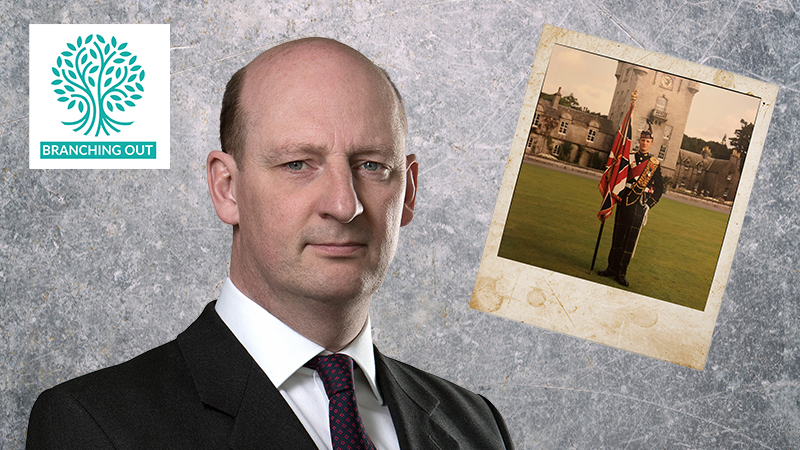For this month’s instalment of ‘Branching Out’, Portfolio Adviser speaks to Aegon Asset Management senior investment specialist Nick Edwardson to discuss his career journey so far.
After graduating university, Edwardson served in the army for four years before beginning his financial services career as a soft commodity futures and options trader in 1995.
He exited financial services to start up his own business, a fruit tree nursery, before rejoining the industry in 2016 on the buy side at Aegon.
While a career in financial services may have few obvious parallels with serving in the army, Aegon Asset Management senior investment specialist Nick Edwardson (pictured) believes his experiences in the military have served him well in the world of investing.
After reading Russian at university, Edwardson was selected to attend Sandhurst for officer training.
He served in the army for four years as part of the Royal Scots infantry regiment, completing a tour of Northern Ireland as well as ceremonial duties.
Having exited the armed forces in 1995, Edwardson’s career in financial services began as a soft commodities trader. Rather than an intended move, he said the decision to switch career came with its own niche set of issues.
“I was putting together my CV when I left the army, and I thought, how does one explain to an HR department or a banker what your military service brings to the party? On a headline level, five years of violence management doesn’t look good if you’re supposed to be sitting in an office juggling numbers,” he says.
“It’s all about soft skills, particularly in my current role as an investment product specialist where I spend a lot of time communicating internally what investment front office are doing and talking with our distribution teams and our marketing department, and helping to frame that message. A lot of that is soft skills, communication.”
Keeping calm under pressure
For Edwardson, a key takeaway from his time in the military was the ability to make decisions under pressure.
“One of the primary things which I think is hugely transferable between a military environment and a financial services environment is the concept of coping with thinking and acting through pressured situations.
“Now, clearly, the parallels are not entirely accurate. The type of pressured situation you might face in the armed forces means that your decision making has to be absolutely spot on. The consequences for not being absolutely spot on are pretty significant if you get your decision making wrong. In financial services, if you’ve pressed the wrong button, consequences are not quite so grave.
“You might lose a lot of money. But ultimately, you still leave the office at the end of the day. That said, I think there’s a genuine parallel between coping with pressured environments, making the right decision, thinking logically through the issues and delivering.”
Edwardson believes the parallel is especially true when it comes to fund managers.
He adds: “One of the things that we used to talk about in the army was the idea of clarity of purpose, what they used to call the selection and maintenance of the aim. You have to be very clear about what you’re trying to do and you have to make sure that all of your activity is designed to continue to achieve your objective.
“It’s not dissimilar to that which fund managers are displaying on the buy side here, understanding what they have to do with their portfolio of assets to deliver the appropriate return for their underlying investors. So I think an idea of understanding that clarity of purpose and how you can deliver that is hugely important.
“And that doesn’t mean dogmatically sticking to the same decision that you make. It means understanding that circumstances change, and if circumstances change, you have to understand that and reflect that in what you do.”
As an example, investors have contended with the market impact of geopolitical shocks, interest rate rises and a pandemic over the last few years.
“All of these things are changing in real time, and you have to be able to process that information and make the right decision,” Edwardson says.
“You need that same sort of skillset, you need to be able to remove some of the noise. Focus on what really are the key issues, extract the important bits, analyse, assess, make the right decision, and act on it. If you’re wrong, accept you’re wrong, cut your position and move on. That comes down to clarity of vision, decisiveness, and ultimately being able to execute that.”
Income investing
Edwardson also quit financial services to set up his own business, a fruit tree nursery, before joining the buy side in 2016 at Aegon.
In his current role as a senior investment specialist, Edwardson acts as a link between the front office and clients — helping to articulate the message around multi-asset products.
“Over the course of the last two years, clearly, we’ve had what we call a bond reset. The yields available in the bond market now — whether it’s government bonds, investment grade or higher yielding credits — are much more attractive than they have been since the global financial crisis.
“The level of income you could get from that bond portfolio was much lower than it has historically been. Bonds have now regained a lot of that utility that they have lost when rates were low, and for investors looking expressly for an income, it is a much more attractive environment than it has been.
“In a slightly higher inflationary environment [than 2%], I think the role of income for investors is important. And we have seen strong interest in fixed income products. The opportunity set across the income environment more generally, is, I think, unusually attractive right now.
“We’re seeing interest across the board, whether it is in investment grade or high yield, credit, multi-asset income, or in our equity income suite products. Income-oriented total return solutions, which have different risk profiles and different drivers, appeal to different customers who have different risk appetites. There is something along that spectrum for most investors, so the income suite is particularly important.”
See also: Alliance Trust: There’s more to markets than the Magnificent Seven











